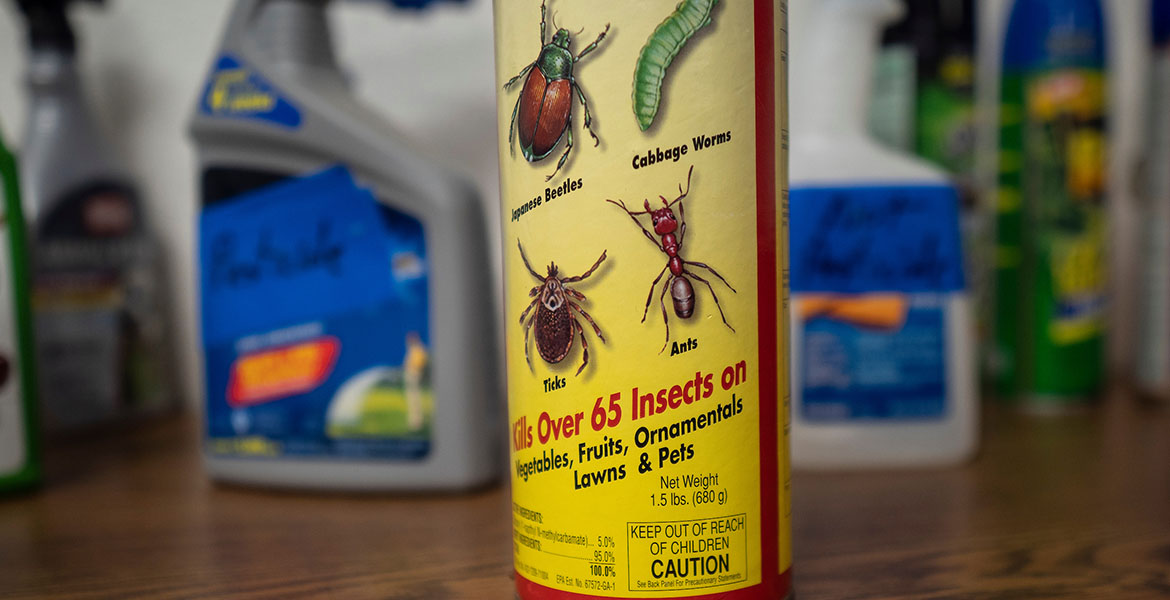
February is National Pesticide Safety Education Month
Tuesday, February 9, 2021
Pesticides have a significant impact on our lives – improving food supply quality, controlling pests in the home, protecting public health and more.
However, these chemical tools must be used with care. To bring light to the safe use of pesticides, the National Stakeholder Team for Pesticide Safety Education Program Funding has recognized February as National Pesticide Safety Education Month.
“The purpose of this month-long observation is to reinforce core principles of safe pesticide use with various audiences and raise awareness of support for the land-grant university Pesticide Safety Education Programs,” said Kevin Shelton, Oklahoma State University Extension associate specialist and coordinator of OSU’s Pesticide Safety Education Program.
“Some people think pesticides are used only in agriculture, but if you use insect repellent, ant bait, weed and feed lawn products, pet flea collars or even disinfectant wipe, you’re using a pesticide. Because they are so common, proper use is essential,” he said.
There’s a growing need for education on pesticides and proper use, especially with newer technologies. For example, users might not think about weather effects on a breezy, sunny day when they’re treating the lawn for weeds: Wind drift can harm surrounding plants. The same is true of rain runoff.
A month dedicated to public education reinforces the need for caution heading into spring. Shelton said following pesticide labels and related regulations cannot be stressed enough.
Before applying pesticides of any kind, Shelton encourages users to follow these guidelines:
- Read the entire label before purchase and use.
- Follow all applicable federal, state, tribal and local laws concerning the use of pesticides and personal protective equipment.
- Seek competent advice if there is something you do not understand on the label or in other applicable laws and regulations.
- Transport pesticides in the trunk or truck bed, separate from passengers, groceries or animal feed, and secure the containers to prevent spills.
- Store pesticides in a locked cabinet or secure area, away from food, feed or personal protective equipment.
- Measure and mix pesticides in a well-ventilated area away from children, pets, toys and food.
- Calibrate and maintain application equipment so the amount of pesticide applied will be accurate, uniform and legal.
- Keep pesticides on the intended target. Be aware of how wind or water can interfere.
- Identify sensitive areas and organisms that could be affected by the application and take necessary precautions.
- Do everything possible to prevent spills and leaks, and always have an absorbent material such as cat litter or sawdust readily available.
- Wash slightly contaminated work clothes separately before reusing, and follow all directions on care and disposal of personal protective equipment.
- Properly dispose of any unused pesticide. Better yet, mix only what is needed for the day.
- Properly dispose of any excess spray mixture, empty containers, and contaminated cleanup material and clothing.
More information from Shelton can be found in this video from OSU’s Division of Agricultural Sciences and Natural Resources SUNUP television program.
Pesticide law defines the term pesticide as any substance or mixture of substances intended for preventing, destroying, repelling or mitigating any pest; any substance or mixture of substances intended for use as a plant regulator, defoliant or desiccant; or any nitrogen stabilizer.
“Whether you’re a homeowner in an urban area, or a rancher with many acres, proper use of pesticides is essential,” Shelton said. “Success in protecting yourself, others and the environment depends on your personal knowledge and diligence when handling pesticides.”
For more information about safely storing pesticides at home, hear what Charles Luper, OSU Extension associate with the Pesticide Safety Education Program, has to say in this Oklahoma Gardening video.
MEDIA CONTACT: Trisha Gedon | Agricultural Communications Services | 405-744-3625 | trisha.gedon@okstate.edu
